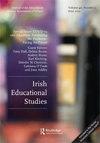Conceptual framework for the participation of children in local area planning decision-making processes through primary geography education
IF 1.2
4区 教育学
Q2 EDUCATION & EDUCATIONAL RESEARCH
引用次数: 0
Abstract
According to Article 12 of the UNCRC, children have a legal right to have their views heard and acted upon as appropriate. In Ireland, this applies to local planning processes concerning children’s localities whereby legislation was specifically enacted to recognise children as a group who were entitled to participate in the local planning process. However, while provisions are being made at policy level, children’s participation in practice is extremely limited. Furthermore, recent research into the teaching of primary school geography in Ireland has found that didactic and text-book approaches are significant with teachers neglecting to teach about the local area and to use experiential learning methods such as fieldwork. Through a qualitative analysis of current research in primary geography education and children’s participation in the planning process, this research presents a conceptual framework which enables children to participate in the local area planning process in Ireland through primary school geography. This conceptual framework provides a systematic and coherent way of approaching children’s participation and the teaching of primary school geography. The key findings from this research centre around the positioning of schools and particularly the primary geography curriculum (PGC) to be the ‘space’ within which children’s participation can and should occur. Enabling children’s participation in planning processes to occur through the PGC serves to bridge the policy-practice gap pertaining to children’s participation, building their capacity to participate, and ensuring the broadest possible sample of the population are included. It also addresses the policy-practice gap in the teaching of geography by ensuring the teaching of lessons involving experiential methods focused on the local area. This conceptual framework sets out a stepped, progressional approach to enabling children to participate in local area planning decisions by carrying out geographical investigations of their localities.儿童通过小学地理教育参与地方规划决策过程的概念框架
根据《联合国儿童权利公约》第12条,儿童有听取意见并酌情采取行动的合法权利。在爱尔兰,这适用于涉及儿童所在地区的地方规划进程,因此专门颁布了立法,承认儿童是一个有权参与地方规划进程的群体。然而,虽然在政策一级作出了规定,但儿童在实践中的参与极为有限。此外,最近对爱尔兰小学地理教学的研究发现,教学和教科书方法很重要,教师忽视了当地的教学,而使用实地考察等体验式学习方法。通过对目前小学地理教育和儿童参与规划过程的研究进行定性分析,本研究提出了一个概念框架,使儿童能够通过小学地理参与爱尔兰的局部区域规划过程。这一概念框架为儿童参与和小学地理教学提供了一种系统和连贯的方法。这项研究的主要发现围绕着学校的定位,特别是小学地理课程(PGC)是儿童参与的“空间”,可以而且应该发生。通过PGC使儿童参与规划过程有助于弥合与儿童参与有关的政策-实践差距,建立他们的参与能力,并确保尽可能广泛地纳入人口样本。它还解决了地理教学中的政策-实践差距,确保课程的教学涉及以当地为重点的经验方法。这一概念框架提出了一种循序渐进的方法,使儿童能够通过对其所在地区进行地理调查来参与当地的规划决策。
本文章由计算机程序翻译,如有差异,请以英文原文为准。
求助全文
约1分钟内获得全文
求助全文

 求助内容:
求助内容: 应助结果提醒方式:
应助结果提醒方式:


